|

Canada's Athabasca Falls.
(*photo credit)
July 1, 2013 Discovering America's Community Relations
Today is Canada Day, and we join in celebrating with our northern neighbor. In fact, in July we focus on community or
neighborly relations. Our vacations, retreats, festivals, fairs, and family reunions become opportunities for improving relations. Why let other forces damage these relations? Why be bullied by the NRA? Why permit drone strikes? Why tolerate billionaires throwing their money round in undemocratic ways? Yes, such questions could be rather a propos but they do not lead to the betterment of community relations. Anger swells among interest groups and it makes for bad picnic and neighborly situations.
On the other hand, as we celebrate the Fourth tomorrow, perhaps the better approach is to be more compassionate through looking at positive aspects of the American experience and our traditional values worth emphasizing: courage in the face of adversity, tolerance of others, hospitality towards newcomers, fairness in the treatment of all, and a sense of federalization that leads to joint global controls of environment and finances.
Courage in the face of adversity could be aroused when thinking about the bullying of America through a plentitude of guns and NRA and militia stances. It takes courage to be gunless in the American armed camp in which we find ourselves.
Tolerance of others whether on the so-called left or right, or the red or blue states, includes accepting neighbors and loving them for what they are; we must not become enemies of those who think differently on religious, economic, or political issues.
Hospitality is an American characteristic either shown when Native Americans welcomed the first Europeans to our shores, or the new nation that encouraged immigration as a means for the improvement of our own country and to give new life to others.
Fairness means that we as a people will take care of those who are socially or economically downtrodden and give them proper food, housing, and health care. This delicate condition of caring for the needy can be damaged when some take unfair advantage in circumstances when they are not in need or are unwilling to work for their food and health benefits. On the other end of the economic spectrum, some pay far less in taxes because they have the power to influence legislation for their own selfish benefit.
Federalization is the most difficult characteristic, for some do not want to expand beyond the thinking of 1787, as though the world stopped at the Constitutional Convention. The event of our coming together as colonies to make a country now requires a world movement to address ill effects of globalization: environmental pollution, maritime piracy, escape industries, and tax havens.
Prayer: Lord, teach us to see the good qualities of the American experience and to champion these in a healthy manner.

Hiking Buffalo Mountain (TN) for view of windfarm.
(*photo credit)
July 2, 2013 Living to See a Renewable Energy Economy
Month after month, renewable energy sources continue to dominate the new electrical generating capacity being brought on-line in the United States. The path towards a zero-coal, zero-nuclear future becomes clearer with each new report.
Ken Bossong, Director, Sun Day Campaign
In 2013 we see changes that make us believe that energy independence is just around the corner, and we can control climate change. Hardly five years ago when American coal-fired plants were still furnishing half of our country's electricity, those of us in coal country could never conceive that changes could be so rapid. Coal was king, a status quo for a half century, and coal miners would be able to retire with full assurances of well earned pensions. All is changed now as loaded coal trains become far fewer and coal companies seek to abandon their long-term commitments to rank and file workers -- but not to CEOs.
In the first quarter of this year, renewable energy (solar, wind, biomass, water, and geothermal) furnished 82% of the new U.S. electrical generating capacity of 1,546 MW -- and natural gas the remainder. No new nuclear, oil, or coal sources came on-line. Wind led the way quarterly with 6 new "units" of larger size (958 MW); water had four (5.4 MW), biomass 28 (46 MW) and solar had 38 units (537 MW). Solar had a singular honor of being the sole new energy provider of new capacity in the windy month of March. Recall that these capacity gains come from low 2005 base lines.
Since the last five years further energy change is hastened as older coal plants are being gradually retired or changed over to competitive natural gas. We can expect the 2% annual slippage of coal-generated electricity to fall below current 36% total amounts. Natural gas and renewables will pick up the generation capacity. Today renewables account for one-sixth of the total capacity with water at 8.5%, wind 5.2%, biomass 1.3%, solar at 0.44%, and geothermal at 0.32%. Some of these renewable sources will be seeing dramatic rises in the next few years. Note that renewable generation is about 13% of the total and not yet at capacity.
On the other hand, nuclear with high initial costs, aging plants, and continuing safety issues will gradually decline from 9.15%, along with oil from 3.54%. However, the big loser will be coal within this decade. This is not due simply to stronger environmental restrictions but more so to pure economics of cheaper gas and renewable energy sources becoming far more competitive. Would that this could be a total win/win situation, but that is not the case for coal miners who ought to be given transition opportunities and pensions. Merely expanding coal exports to Europe and Asia is hardly an environmental or economic answer.
Prayer: Lord, help us to consider the changes that are coming in our economy, to hasten fairness, and be watchful for those who are hurt in the transition process.

Viola, Red River Gorge, KY.
(*photo credit)
July 3, 2013 Creating Justice for All
I pledge allegiance to the flag of the United States of America, and to the Republic for which it stands, one nation, under God, indivisible, with liberty and justice for all.
As we approach July Fourth we ought to reflect on those aspects of our democracy that we take for granted, and which parts are still in process or have been neglected out of smugness. Bill Moyers calls our Pledge of Allegiance written above a "whopper of a lie;" we do not give justice to many, including those on death row, or because we kowtow to the pressure of wealthy plutocratic CEOs. His listing of imperfections of our criminal justice system is valid to a point, but is the Pledge a lie?
Our Pledge of Allegiance can be looked at in various ways. It could be regarded as a statement of triumph and self-righteousness. In this vein it resembles the rather offensive question we may be asked by local evangelists: "I am saved, are you?" We respond that this sounds like a state of sinful presumption just as devoid of the virtue of hope as is the utterance of a despairing person wanting to end it all. Neither wants to work for salvation which is a pledge we take to act in hopeful ways. The pledge to improve extends to the allegiance to the flag. We are not the privileged boasting of our righteousness to the rest of the world that lacks a powerful nation. It is our true pledge to become a free and just land for all.
Moyers' arguments are powerful and I could be emotionally aroused to say "amen" except for one thing -- this Pledge is an ongoing process, not a statement of some concrete status quo. We can say there is a waving flag, a United States, a nation that is quite powerful and hopefully indivisible (provided Texas does not divide and/or break away). We do have a commitment to liberty in many ways, though at times our religious liberty seems to be challenged by federal rules and regulations. But what about justice for all? Is it an accomplished fact?
We are plagued with unfairness in the weak and underfunded court system that does not give adequate legal defense of the poor and neglected. We have billionaires who throw their money around as though it is their right to decide governmental policy because they are rich enough to buy the system. Yes, justice postponed is justice denied, and so we must work all the harder to see that the injustice of founding fathers towards slaves, or indentured workers, or Native Americans or women, or those with less resources has been corrected over time and at great price. The process is not complete as all of us know, but to pledge for justice is not a lie if we mean we are pledged to make it happen. Bill Moyers uses strong language but does it demand leadership by others, or to take matters into our own hands as citizens?
Prayer: Lord, let us say "Thy Kingdom come" and mean this as a pledge that involves our action. Let all our pledges be such.
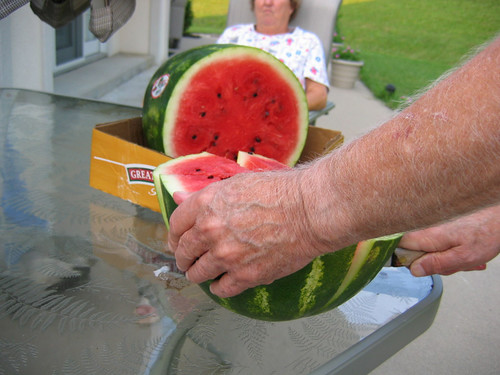
Fresh watermelon for holiday gathering.
(*photo credit)
July 4, 2013 Expressing Love for Our Country through Deeds
As we celebrate this Fourth of July it may be wise for us to see our country in a familial manner, as a loved one, filled with wrinkles that are accepted as well and sometimes overlooked for the sake of household peace. Patriotism involves love and a willingness to sacrifice. To love is to learn, to be in sympathy with, to know our shortcomings, and to pray that we overcome them.
Learn about our country: Learn the length and breadth of our land. Too often people know their locality and little more. I went to school with a New Englander in New York City who truly believed that Buffalo was where the beasts by that name roamed on the expansive prairie somewhere beyond the Hudson River, beyond which he had never cared to venture. To know our states and how they are shaped and which states they border is all part of a geographic knowledge that we need as citizens; to travel about opens us to the American expanse.
Defend our country: This involves a continuation of those who were willing so many times in the history of our country to come to the defense of values held dear. We often wonder whether it is only a rare patriotic streak on the part of some who will be willing to sacrifice their lives for others. Many more would do so in the call to duty, whether working for the government or just ordinary people. Law enforcement people take great risks for the citizenry; parents, educators, and caretakers in hidden ways give lives to fashion our country's law-abiding citizens.
Be Compassionate for our country: Many citizens struggle with health problems, economic difficulties, poor family relations, employment dislike or lack of, and a failure to see a bright future ahead. We know that the aggregate of all these heartaches amount to a national mood of not being as successful as we dream -- perhaps the fading of the American dream. This may lead to either of two extremes: a national sense of desolation and even despair; or with God's help a deepening sense of love and spiritual rebirth. We may escape and neglect others' essential needs, or come to a love that leads to beneficial deeds.
Know our country's needs: We stand at a moment of change in a spiritual dearth, in the way we view future, in the commitment to give health care to all, in a need to help a world to change its environmental policies (especially with respect to fossil fuels), in the way to welcome migrants into full citizenship, in control of the guns that are all about, in addressing our persistent drug problems, and in furnishing adequate nutrition to all our people. These are tall orders and require an aroused citizenry,
not selfish individualized people thinking only of their own welfare apart from essential needs of others.
Prayer: Lord help us to learn, defend, show compassion for, and know our nation's needs, and say a prayer for its continuation.
Only in you do we trust.

Chimaphila umbellata, pipsissiwa.
(*photo credit)
July 5, 2013 Purging Military Terms from Our Vocabulary
Sister Paula Gonzalez once told me after one of our conferences that she thought my language involved too many military terms. She did not give examples but I began to reflect during this period on what I was saying and images used.
A moment for additional reflection. So often our language betrays our inner self, and I testified that I did not want to be competitive, and yet mine was a story of struggles and conflicts in which I was engaged with all the tactics and plans used in combat campaigns. These are simply not part of the vocabulary used by peace-loving people. I never liked the term of "God's marines" for Jesuits and regarded myself as a peaceful person, but the terms used may have told more of what was there in the heart.
Our culture is militant in language and that tells us more than what we want to hear when our military budget almost equals all the rest of the world combined. For outsiders here are some of the terms we use: the big gun is a successful leader or very important person; to trigger is to initiate a process in some fashion; a clean bore where no obstacle is present; a straight shooter is someone who tells it with no frills attached and he or she often hits the mark; a smart gun is one who is experienced with the ways of the world; to target another person or thing is to focus attention on a particular individual; a white flag is to seek a pause to talk in some sort of disagreement; to come with guns loaded means to be prepared for a given contest with proper information at hand; to exchange fire is to engage in discussion with some biting barbs involved and to cease fire is to halt the discussion for a period; to be in the trenches is to be in the middle or thick of a controversy; to look down the barrel is to show a willingness to take up a controversy; to take a bullet for somebody is to sacrifice by accepting blame for another; flash in the pan, means quick publicity for a person not known before; to muzzle is to compress or control; and in my sights is to be the focal point of someone else's expected action.
Discernment is necessary. We have to examine ourselves to change both language and heart. The language of peace comes with time and patience just as the person who curses needs to be mindful that it takes much to clean up foul language patterns. Need I see the exterior and interior world as not just warfare on Satan or armed fighters, but a deliberate movement to a language of peace? Instead we should attend to an atmosphere of peace, serenity, calmness, sacred silence, and trust that positive results will surely come. In fact, choice of words and manner of speaking require effort and an adjustment, a putting of differences behind us in a quest for what is unitive and neighborly, with hope of building better community relations. Peace is a slow process and friendship involve turning spears into pruning hooks and language into words of comfort.
Prayer: Lord, help me to clean up my daily language.

On the shore of Lake Huron.
(*photo credit)
July 6, 2013 Coming to an Understanding of What "Success" Means
A successful person is one who can lay a firm foundation with the bricks others have thrown at him. David Brinkley
Maybe that quote speaks of the common definition of "success", but it is right? We can all agree that Mother Teresa was a spiritual success, but there are a host of American idols or songsters who are known for a few moments and then forgotten. Were they successful? Does temporary popularity breed success? What about the individual standing before the judgment seat of God? Just how successful are we? Do we even judge success properly?
The contented are successful. All of us at one time or other have been acquainted with an individual loved one or neighbor who has been a selfless caregiver for decades or endured abuse at the hands of another. We realize that they took their discomforts with equanimity or seemed totally unmindful of the discomforts of their often shortened lives. They were happy people, were compassionate, overcame adversity without flinching, and even expressed gratitude for their lot in life. In our heart of hearts we know they were "successful," though unrecognized by much of humanity. Their status was known to God alone -- and they were contented with that.
The discontented are successful. There is a second category that may be classed as successful and may include these who build with thrown bricks. Often we are reluctant to call them successful since others take potshots at them. Our common characterization of success as being popular does not allow us to see that status quo breakers may not care about sticks and stones. Instead, these take a stance in direct opposition to popular belief, since that is the way change will ultimately occur. We ask whether Robin Hood could be a saint or whether Thomas Paine would win a popularity contest, and yet they may have triggered successful activities on the part of many. The prophet Jeremiah would not have been called a rousing success in the Israel of his day, and yet he told it like it was, and in due time was regarded as a great prophet.
Measures of success need reevaluation. To be contented in a hidden way or to be discontented for a higher purpose tells us something about great people who were unknown or only recognized later. The story of Christianity is one of a notably unsuccessful itinerant preacher whose ministry was cut abruptly short for "the good of the nation." Yet today, Jesus Christ is proclaimed as Lord by over two million people. Here, apparent lack of success becomes success in a longer term, for he is the master of all success. We are called to reevaluate those we regard as successful in the short span of one lifetime -- and see success as a long-term designation. If we heal our Earth, why give medals to some who do small things and fail at bigger ones? Maybe the media and its immediate audiences are not good judges of who is successful.
Prayer: Lord, give us grace to refrain from seeking success and, if so moved, to accept that it will come after we are gone.

Corallorhiza maculata, spotted coralroot.
(*photo credit)
July 7, 2013 Peace Sunday: Exploring Ways to Peace
Whatever house you go into, let your first words be "Peace to this house!" And if a man of peace lives there, your peace will go and rest on him; if not, it will come back to you. (Luke 10:5-6)
On Peace Sunday we reflect on the many times Jesus said to his disciples, "Peace be with you." This peace was emphasized after his passion and death when he reappeared in his resurrected form. What the cited passage indicates is that peace is a gift that comes and must be received in order to have an affect on the recipient. The gift is there and cannot be tarnished by another, for the giver has a retained peace for future use. Let's view peace from many angles:
Peace is a divine gift for those who have "peace of soul." It is highly possible that some people are agitated and endure desolation due to their own fault or as a testing by God. Others live the good life as best they can on their own.
Peace is a fruit of the Holy Spirit (Gal. 5:25). We are grafted into the true vine, the Prince of Peace. In the Spirit we walk and have our being.
Peace is a fruit of charity along with joy and mercy. It is what St. Augustine says about love, the fulfillment of all of our works. There is the goal; that is why we run; we run toward it, and once we reach it, in it we shall find rest.
Peace is a state of balance and harmony for individuals and groups. We experience what constitutes our own sense of peace. We can also speak of communities and nations that are at peace through justice for all, whether achieved or pledged and in process.
Peace is an urging for something more. We are invited to grow in peace at different times and places such as at the Liturgy itself. We eventually realize that there are degrees of peace and so the hope is that this peace can deepen with time.
Peace is perfected by our action. We can make or disrupt peace. Peace may be of divine origin, but we can enhance or degrade its quality when dealing with the state of our lives. It is not something "out there" that is immutable, but can be fashioned according to the qualities of the peacemaker.
Peace is given as well as received. The quote above tells us that our peace returns if not received properly, and we will know when this is the case.
Peace is freedom from the bondage of war. We must work for global peace and removal of strife among or within nations. Since this is not a current situation, we must work for the realization of peace in our times so that authentic development may occur.
Peace is fragile and must be protected and treated with care. We understand that our efforts to be peacemakers and protectors of peace requires divine assistance and human effort.
Prayer: Prince of Peace, be our guide and model of what we must do and be, and what we must extend to a quarreling and disturbed world -- a genuine peace that you alone can give.

Red milkweed beetle, Tetraopes tetraopthalmus.
(*photo credit)
July 8, 2013 Revealing Wage Theft as a Major Problem
A poor laborer (often undocumented) is picked up at a Texas mall for day labor; he is regarded as an "independent contractor" and so there will be no taxes removed or workman's compensation, since this is normally furnished by independent "agents". In such situations state and nation loses $1.7 billion in annual taxes.
Stolen wages. There is another practice of even greater concern and a matter of simple justice -- and in the construction industry it is an arena of malpractice. Quite often the hiring company promises some sort of compensation and still only gives at best some small amount (say $5 an hour rather than minimum wages) with the rest to come later. The promise of the remaining wage is never paid and the hiring agency tells the worker to get lost. Such is the reality of working conditions, especially for illegal migrants who will not report the theft for fear of being deported. Thus the onus of daily work being unpaid as promised surfaces as a reality that is hidden in this land with justice for all.
Unfair business competition. Such thievery as just mentioned exists and in such states as Texas where enforcement is loose this is raw reality. Those construction companies that follow rules, report and pay reasonable wages and pay taxes are at a disadvantage over those who play loose and get jobs done for less. If a group builds a house and skimps on labor costs then this will be marketed for far less than in states where most play by the rules due to stricter enforcement of the law. Lax states can construct a comparable apartment for half the price of a stricter state, and unfair competition extends to constructed products. Unfair competition is detrimental to those who play fair.
Unfair state-by-state competition. States that brag of being "business friendly" with reasonable housing prices for employees take advantage over others in the tight market for jobs and employment. If labor conditions are loose through lax rule enforcement, then the state has that business friendliness in part through the theft to its working class. What is called "friendly" only applies to the profit mongers, not to the people who are forced to work for promised wages that may be stolen in the end.
Labor Justice groups exist. With globalization we need union organizing and support (see tomorrow). Likewise, a variety of public interest organizations are associated with social, religious, and academic institutions. These are generally small and overworked but often have their ear to the ground as to labor theft. In certain instances, publicity causes the theft to be halted, rarely for laborers to be paid back. In virtually no instance is the actual thief caught and made to give compensation for misdeeds done over years. However, please find these local justice groups and give them your support.
Prayer: Lord, help us to discover the thievery done to the poor laborers in our midst and support their efforts for justice.

Look closely. Megaphasma denticrus, Giant Walking Stick.
(*photo credit)
July 9, 2013 Supporting Labor Union Organizing Today
Some of us take labor unions for granted and forget how much they have benefited the working class, raising them from penniless to a middle class that is threatened today. Do I forget that my public interest roots were partly nurtured by the fruit of laborers? They contributed and built the CIO/AFL headquarters on 16th Street in Washington, DC, our first CSPI office space through the graces of Tony Mazzocchi's Oil, Chemical and Atomic Workers Union. They deserve our continued support (see September 1, 2012).
Challenging labor union times are not just past history. Industrialization, with its horrible excesses in low wages and unhealthy conditions (and fires) still continues to plague garment factory workers in Bangladesh, and wage theft plague workers in Texas -- that "business friendly" state as reported yesterday. Labor still experiences unhealthy situations that cry for a united voice to bring about better wages and working conditions.
These are not just far off conditions in rapidly industrializing nations but also here in the United States that suffers competition and downward mobility by the abuse of shifting corporations from one place to another. Globalization and the threat of higher costs for safer work conditions and wages permit the escapees of responsibility to shift from one place to another. In the 1970s, a nun organized workers here in Kentucky for better conditions and, while strikers blockaded the front door, trucks came in the rear and moved the machinery to a more complacent state. Laborers are victims to such callous corporate mobility.
Labor union membership has fallen to half century lows, especially in "right to work" states (where unions do not have power to oblige workers to join) that now even include the auto union bastion of Michigan. Union membership is dropping in all industrialized nations (from about 90% in 1970 to 68% of total labor force in Sweden, and from 27% of America's four decades ago to about 10% today). It takes money to organize labor. Costs are borne in part by existing union members and that can amount to about $30 per month for those making a little above minimum wage. Benefits of union affiliation are not considered by workers seeking to avoid confrontation -- and especially knowing that mobile corporations can bankrupt or merge and abandon pensions.
An ideal would be if laborers owned the places where they work. Worker ownership keeps occupations stabilized in communities that have grown with certain industries and services. However, the ideal is only in an elementary stage; capitalism still has a sharp claw on the throats of the world's laborers, whether in Western or Asiatic Communistic form. One answer is as in 19th century industrialized America: a strong labor union. We must speak out in their defense when possible and encourage concerned folks who do.
Prayer: Lord, inspire us to come to the support of those organizing folks seeking fair and just labor conditions.
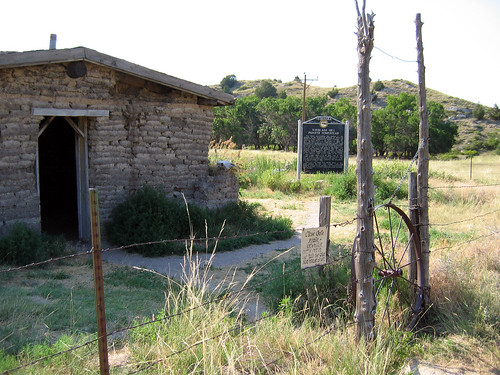
Windlas Hill, sod house, Nebraska.
(*photo credit)
July 10, 2013 Promoting UNESCO Global Cultural Sites
Continuing our reflections on Chapter Four of Reclaiming the Commons includes other actions like the Guidelines mentioned yesterday. Here we focus on the United Nations agency handling these areas of cultural preservation.
--------------------------
The quality of our lives is enhanced by flourishing, diverse cultures -- for in diversity comes richness of human expression. The basic mission of UN Educational, Scientific and Cultural Organization (UNESCO) is to contribute to sustainable human development in a culture of peace underpinned by tolerance, democracy and human rights, through programmes and projects in UNESCO's fields of competence: education, the natural and social sciences, culture and communication and information.
Declaring cultural sites as global heritage areas with protection for safe travel and accommodations is a welcome activity. These are actually quite numerous.5 Just as recognition of local sites when left unprotected invites vandalism, so it does at a global level. However, global recognition, along with adequate promotion and protection, may tap into a growing willingness of tourists to assist in fee payments. In poorer areas, tourist fees may be insufficient to maintain such sites and other funding sources will have to be found.
Global heritage sites include the Temple Mount in Jerusalem, St. Peter's in Rome, Saint Sophia in Istanbul, the Taj Mahal in India, and Angkor Wat in Cambodia. The Smithsonian Institution lists ten endangered global cultural treasures including Visoki Decani Monastery in Kosovo and Jaisalmeer Fort in India.6 The religious and cultural requirements, activities, and fund-raising could continue, and worship times and space would be respected. Praying at or near the site would expand the sense of global social capital -- our common brother- and sisterhood through religious expression.
Funding: UNESCO cultural site preservation is in great need of funding today. The number of these defined global sites could be increased to the degree that money would allow for guards, guides, preservationists, and promotion people.
-----------------------
Most likely the best way to fund preservation projects is through a total or partial entrance fee at the site itself -- though some religious or other cultural groups may find this out of keeping with their own manner of acting. Perhaps this fee could be extended to a tax on tourist agencies that include the particular sites on their tours.
Prayer: Lord, give grace to those who wish to preserve for future generations cultural sites so dear to being human.

Appalachian stream, eastern Tennessee.
(*photo credit)
July 11, 2013 Trying to Spell the Sound of Rushing Water
Water sounds that differ throughout the year intrigue us (see
February 28, 2011); consider reading our Water Sounds (Marquette University Press, 2010). Water sounds must have delighted Pere Marquette or any adventuresome person exploring the great wilderness and Great Lakes region. All of us notice the variety of sounds that can come from moving water and how these may differ through the seasons. Often we are captivated by the rush of moving water -- flooding river, roar of the waterfalls, crash of waves, even running of water at a faucet or shower.
We try to imitate it and find it nearly impossible. We would at least like to spell it, but seem at a loss even in the clever paths of onomatopoeia (forming words by imitating the natural sound). Is it "gush," "guzzle," "trickle," or "swish"? Hardly. This puzzle comes back again ever since early youth during the lazy days of mid-July when the world seemed to stand still even while living waters move on and on. Water reminds us that our dreams that mortal life stands still are all wrong. It moves on even when we hope an enjoyable moment will stay awhile. Some day it will, but not now. Let's consider the secrets of the gurgling creek (with attached photos) in Appalachian Sensations:
July -- Secrets of the Gurgling Creek
You set springs gushing in ravines,
rushing down between the mountains,
supplying water for wild animals,
attracting the thirsty wild donkeys;
near there the birds of the air make their nests
and sing among the branches.
(Psalm 104:10-12)
What is the sound of rushing water? Does it start with "g" or "l" or maybe "b?" I am unable even to start to spell the sound of water rushing over rocks, although it certainly is a familiar sound. I strain and pause in utter confusion. Why must I spell the sound of rushing water? Is it not enough that I hear it, observe it, and allow it to enter me like the musical rhythms of my heart? Other creatures, the mice and the copperheads and the birds, know this rushing stream and yet do not attempt to spell it. They come to drink and maybe find something to eat. Let me pause as well, and enjoy the blessings of the gurgling stream without trying to rationalize the occasion. Must I give a name and control it by spelling the sound, or is it enough just to listen? Let this rushing stream penetrate my being without demanding extra effort; let it teach me to be satisfied with this precious moment for just what it is.
Prayer: Lord, in this year of environmental water problems, help us treasure the plentitude and purity of the gift of water that you have given us.

A quiet moment with the Trillium sessile in central Kentucky.
(*photo credit)
July 12, 2013 Reasons for Making an Annual Retreat
A friendly critic asked me why I assume all readers make annual retreats: the physical environment for an annual retreat (Jan. 8, 2008), planning for one (Jan. 6, 2009), defending July as a good time for one (July 14, 2010), and suggestions for improving this retreat (July 15, 2011). Add to this two reflections on designing and building retreat cabins.
The majority of people do not make retreats. It's hard to muster arguments for coming to church every Sunday; it is even harder to convince one to make a retreat. Here is my effort:
Free choice: I am uncertain YOU should make an annual retreat. Do not regard this as a dutiful imposition. You may have some decisions to make here and now and could benefit from a special prayer time, but many people find it best to talk to the Lord on an ongoing basis, and my imposing another "ought" on them could be discomforting. Rather, I testify that many retreatants profit from such an annual review of their own journey. Many readers of this would do the same, for they are reflecting people and an annual review is a focusing on where we are going. Bikers often stop to take breaks; artists pause to look over their work; cooks taste what they make. An annual retreat is a humane break.
Think of modified place and time: We ought not make the unavailability of a sequestered place be an excuse from an annual review. The retreat could be made in one's living facilities over a period of time (one evening a week), often with assistance of a director (a Nineteenth Annotation Retreat). Google for details. Place and time may vary significantly depending on circumstances.
Opportunity to Review: This may not be the time for you to decide on the annual retreat especially with all the busyness in life. "Suggest another time" you may say. Certainly, if you have read this far, know that God may be calling. I am actually in retreat as of this very moment, but this is a duty that Jesuits undertake. Another time may be better for you, dependent on various factors and personal choices. Retreats in general are for those desiring to grow spiritually, even while immersed in a materialistic world of great distractions. An annual retreat is a possibility to respond to God's call to slow down and reflect.
Cultivating gratitude: Lastly, an annual retreat is a chance to show gratitude to God for good things given. The one gift we can freely give (though even the urging is a gift), is extended thanks. Yes, we can utter a simple thanks in words for a brief moment or through an extended period of time. Making such a time span available takes effort, and this may be difficult to find and achieve. The further we advance in age, the more we have to be ever thankful and to make this a sacrifice of time offered to God.
Prayer: Lord, give us the grace to do what is always right,
even in explaining what we always do.

Uncommon yellow form of "moon and stars" heirloom watermelon.
(*photo credit)
July 13, 2013 Appreciating the Exquisite Tastes of July
I am no gourmet but do enjoy seasonal foods -- at least a simple taste of it once a year. We ought to accompany the tasting with a short prayer of thanksgiving for taste buds and for wonderful things to stimulate them.
While Appalachian Sensations tasting choice for July is "watermelon," still one could argue that berries are a special July taste -- blackberries, wineberries, raspberries, dewberries, mulberries, ever-bearing strawberries, and some blueberries -- and others (see July 14, 2006). These and other ripening fruit, such as plums (wild and cultivated), peaches, and nectarines, are all in season along with a host of vegetables, especially early tomatoes. Acquire our featured book Appalachian Sensations and enjoy the many Warren Brunner photos, some of which will make your mouth water.
---------------------------
July -- Eating Watermelon Outdoors
I am the rose of Sharon,
the lily of the valleys.
In his longed-for shade I am seated
and his fruit is sweet to my taste.
(Song of Songs 2:1, 3b).
The finer tastes of life are generally regarded as the fare of the rich and affluent. But that doesn't have to be the case. What about those who grow and appreciate locally-grown produce? In
fact, in our modern age some are so prone to choosing only what their peers like that they never go beyond the fare of pizza and
hamburgers, fries and cokes. They have restricted their tastes and
miss the multitude of fine foods all around, especially the homegrown products of special human care and quality.
Homegrown foods should be an essential part of modern life, especially since so many Appalachians thrived on them for decades. We put our love into our land's produce and this adds to the taste, by work as much as the "green thumb." It yields quality freshness, when sun‑ripened produce are brought to our dinner table. Yes, growers and consumers know the difference. We need to return to a refinement in taste reserved, not to those with money, but to those who have invested in seeing crops produce edible delights. The work of our hands is a glory to behold! And the hands of dedicated gardeners add something to good taste.
------------------------
Prayer: Lord, allow our sensations to be honed to enjoy a little bit of everything and not excessive amounts of anything. Allow us to be satisfied with a limited amount and to avoid a greedy attitude, especially about the better tastes of life.
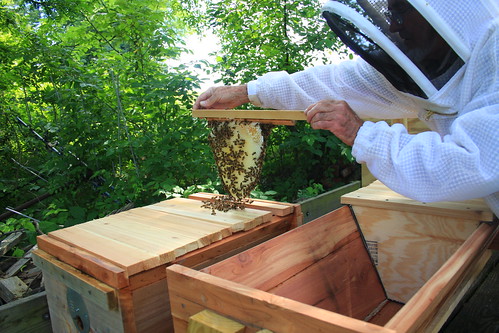
Finding new friends with the honeybees.
(*photo credit)
July 14, 2013 Loving Our Neighbor as Ourselves
When we are in trouble we hope there are neighbors out there to help us. The Good Samaritan story is presented once again, and each rereading allows us to probe into one of Christ's parables with the richness of spiritual insight. Would that personal stories had such a powerful appeal. Elements worth considering here include:
* Affirm concern about another's wellbeing -- The first two (priest and Levite) passed by and denied even seeing the
person; they did not want to be ritually contaminated. On the other hand the initial thought of the Samaritan who saw someone in need was to stop and help. We must see authentic suffering and not allow ourselves to be blinded by current concerns and habits.
* Accept anyone as our neighbor -- We do not limit neighbors to those who we are close to by blood, locality, religion, ethnic background, economic status, or political influence. Someone is in need, not withstanding those of traditional hostility. Mother Teresa also taught us that all people who suffer are neighbors, but we must be willing to enter into the neighborhood of the suffering.
* We give what we can -- Good Samaritans are those who go to the scene with the little that can be given, and yet do their best. In the parable the Good Samaritan poured oil and wine on the wounds of the victim. Some would hasten to remove themselves from a recognized crisis by simply saying they do not have the resources to do anything meaningful -- and turn away to be occupied by other things. We would not seek to escape the situation but be present.
* We share time for our neighbor -- The emergency care means stopping and getting involved, even though the initial impulse is to let others do the dirty work. As Christians, we accept that our time is the victim's time and thus a shared gift within a neighborhood. This tells us that sharing of time is what constitutes good neighborly relations.
* We accept that we are limited -- This is the opposite of excuse wherein we try to reason for not being neighborly. The neighbor is made to realize that we can only do so much but it is all we have to give.
* We are willing to follow through -- This last is often the most overlooked for we have a bureaucratic streak in us to allow some other primary care person to take over; we limit neighborliness to delivering the victim to another. What we find so telling in the parable is that the Samaritan is willing to expend resources and offers to stop back and assist later if need be -- a mark of enduring concern and responsibility.
Prayer: Lord, teach us to be neighborly in whatever way we can. Help us to enter the tougher scenes around us and engage in helping those who are truly in need even at cost to us.

The carpenter bee.
(*photo credit)
July 15, 2013 Globalization Can Be an Assault on Cultures
We treat subjects found in Reclaiming the Commons each month of 2013 and focus in July on Chapter Four, the Cultural Commons. In the book are four areas of infringement: indifference to preserving treasures; commercial development of cultural sites; loss of ancestral languages; and this excerpt (title above).
-------------------------
A lack of valuing a culture leads to an indifference that can affect people in noticeable ways. Intolerance creeps in, hospitality slackens, and discrimination occurs in subtle ways. Military struggles bring on resentment and hatred, and bullying and friction increase, especially against minority groups in a country. Religion involves more than private spiritual practice; it is the public manifestation of one's beliefs, involving acknowledgement of a Supreme Being through acts of reverence, petition, contrition, and gratitude. These religious expressions are cultural treasures.
Religious bias and persecution devalues these religious expressions, and unfortunately is present in many parts of the globe, as enumerated by human rights groups. Blasphemy laws exist in Pakistan and Iran against non-Muslims, resulting in imprisonment and even death. Persecution against various religious groups occurs in China and North Korea. Conversion away from a predominant religion can even bring death in certain Middle East countries. America prides itself in separation of church and state; while early colonies restricted religious groups as set by established churches or first settlers, this was regarded as oppressive by the country's founders. However, American constitutional guarantees of freedom of worship did not erase the barriers to Catholics and Jews for decades. Pity the convert to Christianity today in Afghanistan.
Concerns mentioned here are receiving national and United Nations attention. Human rights violations among migrants and refugees are of special concern. Cultural restrictions have economic ramifications, for discrimination often targets minorities with lower income. Often, governments are reluctant to take steps to defend the oppressed because majority groups dictate policy and governments find religious discrimination embarrassing.
----------------------
We focus so often on enactment of rules and regulations to curb injustices that we overlook the climate and attitudes of enforcing police and other agencies. When influenced by powerful cultural attitudes, minorities are not protected even by laws that are on the books. See last week's (July 8) treatment of laborers, especially illegal migrants who hesitate to make public their justified grievances and are confronted by enforcement laxity.
Prayer: Lord, give us the insight needed to protect those who are suffering through injustice of any form. Make us observant of injustices all about and help us discover those who are wounded.

Chickory, Cichorium intybus.
(*photo credit)
July 16, 2013 Listing Green Tourist Guidelines
July is high tourist season in the United States; it is the only free month from schooling for many in this country. The environmentally concerned want to do the right thing and are motivated, especially when they observe others messing up pristine environment through careless habits. We can lessen any detrimental tourist impact through simple guidelines that are found in our book: Ecotourism in Appalachia(University Press of Kentucky). These guidelines are also listed as ways to reclaim our cultural commons in Reclaiming the Commons:
------------------------------
Green Tourist Guidelines
By the twenty-first century, tourism, the world's fastest growing service industry during prosperous periods, has approached an annual one trillion dollar business on the global scale. Although tourism thrives where sites, transportation, and lodging are maintained, still the welcoming attitude of people is of immense importance. In order to respect native cultures, green tourist guidelines include:
* Be aware that the carrying capacity of certain regions is exceeded by excessive tourism that puts stress on land, roads, waste facilities, and the flora and fauna;
* Curtail distance travel as petroleum supplies diminish; while luxury travel is at the heart of the airlines economy, conserving limited petroleum supplies for more essential purposes still comes first;
* Pack out and dispose properly of what you pack in;
* Encourage infrequent long-distance trips (local travel -- frequently, regional/national -- infrequently, global -- rarely, and space only for scientific purposes) and substitute virtual travel using Internet videotapes or printed travelogues, especially for wilderness tours;
* Emphasize travel closer to home using bikes or walking tours where possible ("stay-cations");
* Curb all-terrain vehicle use in fragile areas, and declare such areas off-limits to all for recuperative periods of time;
* Initiate a three-part cultural preservation program that focuses on tourist satisfaction, preservation of the culture and environment, and just compensation for local workers;
* Promote the region's natural flora and fauna as well as cultural and geological highlights; and
* Train tour guides in cultural highlights and local ecology.
--------------------------------
Prayer: Lord, give us an understanding of being responsible tourists when we travel abroad or near home. Help us to refrain from wearing out our welcome through practices that threaten or degrade the local environment; teach us to be good models.

Blue-eyed grass.
(*photo credit)
July 17, 2013 God is Love: Examining What This Means
We know that St. John's Letter says that "God is Love." We also know that our English word love loosely translates several words in Greek (Storge or affection; Eros or sexual love, Agape or the Christian concept of unconditional love as in "love feasts" and liturgical celebrations, and Philia or dispassionate virtuous love or friendship within a family). Recall that Jesus asks Peter in the post-Resurrection event in Chapter 21 of St. John's Gospel if he loves him; Jesus uses Agape the first two times and Philia in the third question. Thus there are ever deeper degrees of love expected of a follower of Christ -- and Jesus requires ever deeper love from Peter who had denied him three times on Good Friday.
Love is reciprocal. As God loves us so ought we to love in return. But how can we return love, which is infinite, except that God gives us what it takes. Our love must also be unconditional love and yet it ought to ever deepen. As we come to recognize God's love we discover how little we can do in return without divine inspiration. Love is between those who are present to each other. In this sense of relationship to others we realize that God as creator is the source of love and source of more perfect love. God is good; God is holy; God is all powerful. In each of these utterances we declare again and again that good things come from God and not from ourselves, and goodness has divine origin.
Atheism confronts us. Some in this world of growing atheism state that they have loving relations with others and thus are the origin of love among them and neighbors. The logic of ex-believers is that if "God is love" and they find no personal God in the universe, then in their loving relationships and company they are "gods. The very expression of this belief causes deists discomfort, for our nation was founded on a firm belief in a Holy Other, a Higher Power beyond us, a personal God to whom we must some day give an account, a Being to whom we pledge our Motto "In God we trust." Such a God is alien to the modern atheist who regards his or her ability to love to be proof enough of no need for the God professed by People of the Book.
For believers, we trust in God's goodness and mercy. We seek an abiding friendship between persons, not between persons and things. We love God with our whole heart, soul, mind and strength. But how can we love thus when we are so limited? Only when we see that we are diving into an ocean of love in which we can only survive through the loving God who buoys us up. We are at God's mercy to love with our whole being; we are incapable of loving without God giving us that ability. Our neighbors, loving atheists, see no incapability, for they are more than atheists; they make themselves and their related neighbors into gods. Our dealing with them includes a candid admission of difference lest we give obeisance to their false constructed gods.
Prayer: God, give me strength to love and act wisely, to see you as the Holy Other, and to profess this belief openly.

Visiting the Daniel Boone National Forest.
(*photo credit)
July 18, 2013 Wood Biomass: Renewable Energy or Forest Disaster?
Biomass is wood and other combustible materials used for fuel in space and water heating and the production of electricity. While the combustion emits soot and other toxic emissions, it is commonly regarded as a renewable energy source because in due time it will be replaced by other wood-bearing trees. Now half of Europe's "renewable energy consumption" (over 80% in Finland and Poland and 38% in Germany) is counted as being from wood. Will burning wood have an equivalent renewable replacement? In theory, equivalent amounts of carbon dioxide emitted in combustion will be captured in forest growth. The assumption is that wood is carbon neutral, and thus European wood use has soared when declared a renewable energy source; it is expected to help meet the goal of 20% renewables by 2020. Wood biomass is also popular as fuel in the U.S. (28 units for generating electricity were built in 2012); it is used to generate 105 GWh/d in 2013 and is expected to increase to 111 GWh/d in 2014, along with waste biomass holding steady in this and next year at 56 GWh/d.
Certainly, wood biomass has other advantages: its combustion product is less toxic than coal and can assist to keep coal-fired plants within conformity regulations; it is reasonably priced and otherwise a worrisome waste material; it can be used as mixed with coal in smaller amounts without any changes in the power plant; and it is a non-intermittent fuel in contrast to solar and wind energy sources. However, the wood-sourced fuel is not perfectly "green," whereas burning waste biomass uses materials that would be buried.
The contention that wood biomass is carbon neutral and can be classified as a renewable energy source is an over-simplification. Much depends on forest type, growth rate, and other conditions. Lands used for wood harvest could grow other crops that sequesters carbon dioxide quickly; burning wood increased the carbon dioxide today when curbing is so utterly necessary, whereas growing trees to absorb the equivalent carbon could take a century if growth rates hold up. Further, procurement of wood often requires petroleum-fueled equipment in cutting, loading, and transporting the wood. The real sleeper is that much wood biomass is in the form of pellets that take processing energy to turn wood into a slurry from which pellets will ultimately be extruded and dried.
The craze for wood biomass for renewable fuels to meet set renewable energy goals in highly industrialized lands can mean partial destruction of forests and only questionable climate change reduction. Wood sources are being sought for Europe's hungry power plants from other continents (13 million tons in 2013 to twice that amount in 2020). Demands are huge; supplies in burdened forests are limited. Yes, a growing forest is a net sink of carbon dioxide and proper harvesting is expected, but is biomass wood extraction done with moderation? (The Economist, April 6 2013, p. 71-2).
Prayer: Lord, let our people see the folly of their ways when it comes to wood biomass.

Zigadenus glaucus, Dune lily.
(*photo credit)
July 19, 2013 Not Tolerating Indoor and Outdoor Air Pollution
Reflect on it! Air, the free gift of our Creator to all on this planet is polluted and does harm to human beings, animals and plants in untold amounts even after years of recognizing the seriousness of the problem. This air is a commons which belongs to all of us and is not to be damaged by privileged individuals and groups who pollute as though it is their right. If damage were minor, this would not be a problem, but we are fully aware that major effects are occurring through industrialization processes.
Air pollution kills more people than AIDS and Malaria; the U.N. World Health Organization study estimates that 3.5 million die annually throughout the world from indoor air pollution (generally women, children and home-bound in poorer countries). Likewise, another 3.3 million die annually from outdoor air pollution. These numbers have not really changed much in the past four decades, but why, with all the environmental awareness of the most elementary form of global contamination? On top of this, excessive emissions of carbon dioxide and methane partly through human generation are contributing to the climate change that is affecting our planet, and we only have a narrowing window of time to make a difference.
We seem to lack the will to fight outdoor pollution. The devastation is not the only problem. The ease of addressing the issue is not a mystery but it requires our will to act as a people. The U.N. Industrial Development Organization says that cleaner energy could halve total climate change effects by the year 2030. Much of this can be achieved by expanded use of solar, wind and other renewable energy sources both in transportation and in the generation of electricity. Further additions can be achieved by more energy-efficient industrial and space heating and cooling practices. These are proven to be both resource saving and good financial investments, but we must will to make such changes.
What about barriers to curb indoor air pollution problems? I learned of these when in India a quarter of a century ago -- and the problems persist. We can say that solar cookers would be an answer for the poor woman cook, but she does much of this work before sunrise or after sunset; many but not all meals include dishes requiring an intense source of heat that solar cannot give; and getting the method to the people takes painstaking promotion that takes needed educators. However, with some concerted efforts at energy efficient wood stoves and solar cookers (see August 7, 2007) we could reduce immensely the total victims to the indoor scourge. It is well worth Peace Corps and alternative service-type efforts by a host of industrialized nations. The analysis of the environmental condition is elementary; the methods of improvement are low cost; and the pay-back is so easily recognized by the victims of indoor air pollution. This can be the world's premier win/win situation.
Prayer: Spirit who moves over the waters, inspire us to know and to resolve as a people to preserve clean air for good of all.

Red admiral, Vanessa atalanta.
(*photo credit)
July 20, 2013 Defining Culture Differently
People define culture in different ways based on ethnicity, political, or economic perspectives. The following is part of Chapter Four in Reclaiming the Commons:
----------------------------------
Comparison of Two Cultural Views
Disparity of wealth at all levels erodes the cultural capital of a community whether local or global -- and by allowing this situation we become party to this offense. In some cases those who are acquainted with this emerging global wealthy elite conclude that America needs its plutocrats. Modern culture must look beyond wealth and find spiritual motivation.
* Individual:
Greed is a virtue and Charity is the concern and decision of the privileged, versus
Sharing is a virtue but charity can be an exercise of power, and so doing justice is better than merely giving to the needy in charity.
* Regional:
* Consumers will be motivated materially to strive for greater shares of the resource pie; and
* Economic and corporate privilege knows best, no matter what the world mess, because the poor know so little, versus
The material pie is limited; motivation should be directed to higher spiritual and qualitative horizons.
Beware of the materially privileged and realize that "the poor" hold the key to rising and saving the Earth.
* National:
Democracy means complete free choice, and millionaires have a right to become billionaires, versus
Democracy is harmed by excessive wealth and Superrich inequalities hurt the human society.
* International:
Free market and free trade are articles of faith;
Credit energizes a culture of consumption, which influences people and nations far and wide, versus
The market must be regulated and trade must be fair along with consumer rights protected;
Capital and credit are dangerous when unregulated.
* Global:
Government is despised, complacent, disparaged, and manipulated as a source of bailouts, and
Problems are solved solely by secular procedures, versus
Good government is absolutely necessary for the sake of our wounded Earth and our global economy, and troubles stem from a lack of reverence and faith in the future.
------------------------------
Prayer: Lord, make us broad-minded when understanding culture.

Bracken fern, Pteridium, along a forest trail.
(*photo credit)
July 21, 2013 Martha & Mary: Choosing the Better Part
Martha, Martha, he said, you worry and fret about so many things, and yet few are needed, indeed only one. It is Mary who has chosen the better part; it is not to be taken from her.
(Luke 10:41-2)
From a secular view the concerns of Martha seem highly justified, for to prepare a meal for the Lord in a world devoid of microwaves and refrigeration must have been a real challenge. Most likely the fireplace for the baking had to be tended carefully, the meat cooked and prepared in special ways, the olives, figs and dates selected, and special wine obtained. In other words, it took work and required many small tasks to make a perfect meal for so honored a guest. One can sympathize with Martha's request to have a little support from her sister for helping in the preparation.
Jesus does not agree with Martha, however. Mary is not to be deprived of listening to the Word of God. She is a true follower and willing to listen attentively, and this spiritual plane of service is the higher level. To hear and reflect on God's word is a better part of human life, though not the only one. Jesus does not tell Martha to relinquish her serving role and do what Mary does, only to allow her to include attention specifically to the guest as a higher calling, even with other needed essential service expected as part of total hospitality. A simultaneous set of services is the more balanced approach.
I continue to struggle with an interpretation of this passage, and in fact, being an activist and one who considers the priority of action, find this to be a deference to reflection and its priority. Let's resolve this in that Mary takes the choice part in communication with the Lord, but Martha has an important role provided she does not break the continuity of a unity in communication through her fretting and negative attitude. Prayer and work go together and some souls must at a given time do one and at another time do another; another is called in a different way.
A delicate balance was called for here. In a perfect world, Martha ought to have not fretted but done her dutiful service with the fullness of generosity that Mary was doing an equally important (and even a greater) task in listening to Christ's word at that given moment. Martha was called at a different time to listen to God's word, but in allowing her sister the opportunity to listen more intensely, Martha ought to have rejoiced that both were doing what they were called to do -- even if her own service was of a more humble degree. Jesus does not say, stop your actions and come sit with Mary. He only said don't fret. The resolution is that those reflecting on Word must do so, and those preparing to help them reflect must also do so. Both are needed.
Prayer: Lord, teach us to always listen and, while we cannot always multitask, at least allow us to be free from fretting that our current task is what another should be doing here and now.
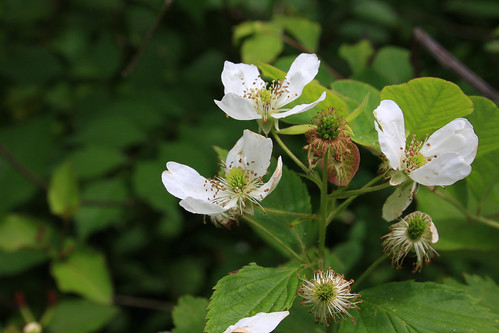
Summer treat: fresh berries.
(*photo credit)
July 22, 2013 Eating Food With Others Has Sacred Significance
In July, we have many picnics and gatherings and need to ask ourselves about the importance of food gatherings. Meals fit into the Gospels in many places and Jesus is central.
Recall the Marriage Feast of Cana, or the meal marking a significant time in life with an embarrassing moment of lack of a basic ingredient; that was Jesus' first miracle. We read of the Multiplication of the Loaves in each of the Gospels, the physical needs of people for food in a deserted place being a key to the miracle of sharing food with others. The Last Supper is of special importance for it is the reenactment of the Jewish Seder, the constituting of a New Covenant bonding, the instituting of the Eucharist, and contains a discourse on love (three chapters in St. John's Gospel).
Eating food fits into the post resurrection narratives of St. John including Jesus himself as servant preparing the meal that the hungry disciples can recline and eat with him. In fact, this is the last act recorded in that Gospel. The Emmaus Episode in Luke's Gospel is a food-centered situation of hospitality whereas Jesus' Presence is realized in Bread Breaking -- a name given to the early Christian liturgy. Instances of others having Jesus as a guest, such as the Mary and Martha incident in Luke's Gospel, involve others preparing a meal for Jesus. In John's Chapter 21 Jesus actually prepares the food (bread and fish) for breakfast, and then invites the disciples to bring some of their miraculous fish catch and include it in the meal -- a grand potluck. We are all invited to a sacred meal and to participate in preparing and consuming it.
Etiquette is an important aspect of eating as we all know. Jesus speaks of the King preparing a large feast, and the invited guests excusing themselves; then the king calls in strangers -- but he demands the proper garment. We know that it is not the custom of the garment wearing that is important here but the attitude of the guests to fully participate. We need to come to the meal ready to follow the proper deportment. This proper manner also is expressed in stories about failure to give the ritual washing and yet the sinner came and bathed Jesus' feet with her hair.
Partaking of food together makes us one, whether a secular meal or the Sacred Liturgy. For a period of the Middle Ages principally the celebrating officials consumed the communion in normal Liturgies, but with the reforms in the Church after Vatican II we have far wider participation by the people in this event. We are a people who come together and become one people when we eat food together. We come to know and feel the needs of others and assist them in our presence, and they help us by their presence with us. A community is formed together through a sacred meal.
Prayer: Lord, give us the moment that we desire to eat with you, to thank you for the bounty provided, and to share it fully with those in community in a most generous and hospitable manner.
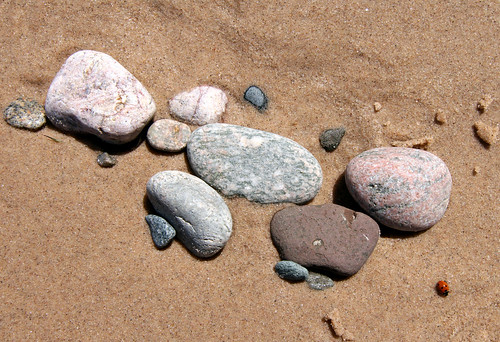
Ladybird beetle exploring "boulders" (pebbles) along sandy shores.
(*photo credit)
July 23, 2013 Addressing Anti-Boredom Month
For many who are out of school or on vacation this is a challenging time to stop the devil from setting up a workshop. Here are some suggestions for overcoming boredom:
* Accept some light reading material that is a change of pace and yet quite engaging;
* Perform a different physical exercise today, but don't overdo it, for the muscles need adjusting;
* Light a vigil light for a sick friend and leave word of what you have done for him or her;
* Vary your hour of sleeping and rising so that the biological clock is challenged for part of the summer;
* Strike up a conversation with a neighbor whom you have ignored over time. Most likely you have much in common;
* Discover a new hiking route and make it a little longer, though change the gait to a slower one in hot July. Consider stopping and listening to the sounds of July or carry a bag and pick up a little litter along the way;
* Go to a movie, festival or music concert when these are not your routine forms of entertainment;
* Check your phone listings for someone you have not contacted in a half year and make a surprise call out of the blue. I once did this to a relative and found it was the day before their 50th wedding anniversary -- and I did not have a clue;
* Take time this evening to watch the sunset, perhaps with another person. You may prefer to paint, draw, photograph, or write what comes to mind;
* Spend the evening with the stars. The Perseid Meteor Showers begin tonight and outdoor night gazing may not be part of your routine;
* Watch butterflies or hummingbirds and study how they conduct their everyday feeding habits. Perhaps this is the time to prepare a feeding place for them;
* Visit an overlooked website and see what it has to offer. One possibility is to look at the NOAA photos of the Earth;
* Hot weather allows a new flavor of ice cream and the month with ice cream emphasis is worthy of a change of pace;
* Go out and seek and pick some berries, for this is the height of berry season, and you deserve the taste of July one more time. Perhaps pluck some more to share with others;
* Clean out the pile of papers that is hardly ever looked at, for there will undoubtedly be some pleasant surprises in looking these over;
* Visit a farmers' market or a yard sale and spend some
extra time in conversation; and
* Give some extra time to prayer or undertake a devotion that you do not normally do, whether in home, church, or in the great outdoors.
Prayer: Lord, give us a hundred ways to break boredom and to use vacation or "down time" in a spiritually profitable way.

Black rat snake, Elaphe obsoleta, in clover patch. Washington Co., KY.
(*photo credit)
July 24, 2013 Modern Idolatry: Tearing Down Our Personal Idols
Idols can be a multitude of things. However, the images and sacred trees of past ages seem so far removed from our consciousness, that we regard idolatry as passé, but is it? We are always aware that some others (than ourselves) will make their automobiles, boats, houses, electronic devices, and other "material things" into what Christians in the past called "dumb idols," that had no power to do anything but mesmerize a person. However, the growth in sophistication and informational access does not change that basic nature of people to seek insatiable materialism in some form; such a false quest only leads to continued frustration and ever deeper search for false objects.
Idols can be people. Making people into idols may have been around for ages as well when the leader or master or emperor was the idolized god to the follower, who gained status by being close to the proposed god. Think of the North Korean 100% acceptance of a youngster with little experience at anything other than being son and grandson of another material idolized personage. To idolize another appears to be here to stay in some form -- though all of these are highly unbalanced and anti-democratic. In the mid- twentieth century, I recall young adolescents (mainly girls) swooning over a pop singer (Elvis P.) or movie star (Frankie S.) and others (mainly boys) idolizing sports figures (Mickie M.). Those who know the current scene assure me the phenomenon continues today with a variety of people whose popularity rises and falls with the tides -- and become familiar Facebook images.
Idols can be us. This third modern trend finds a variety of expressions: the truly popularized person who is well known as recognized through TV appearances or forms of notoriety may regard him or herself as truly an "American idol." However, even those of instant fame realize how short the span is until another surfaces to replace them. A second set of possible personal idols are those of us with some message worth conveying to others. That includes successful writers, political leaders, wealthy reformers, prophetic types, religious leaders, and just about anyone who through self promotion can be seen or felt in an ever-changing world.
Idols can be a group of us. This last series is somewhat more difficult to treat because it may not be as evident as the first three groups. It is those who regard "god" as among a group of the elite of which the proponent is privileged to be associated. This person knows full well that an over stress on him or herself will be of short duration, but a longer span is in the wish that the elite grouping can endure with strength in unity. This is as dangerous a type as any and has the same difficulty of all the three previous classes -- the failure to see God as the Holy Other who must be adored and placed apart from human constructed idols. An addicted society is in need of God alone.
Prayer: Lord, allow all to see the foibles of false gods and that the tendencies are still as rampant as in any age of the past.

A summer bouquet.
(*photo credit)
July 25, 2013 Extractive Industry vs. Tourism/Retiree Communities
Why this title? Appalachia has been a target region for extracting coal, timber, and to a lesser degree gas and oil. The assumption is that some higher paying jobs are created by the extraction process. Without these jobs the region would lapse into subsistence living and the most modest of living standards. However, every tree potentially cut for timber has some standing value for tourism and a setting for retirement communities (two areas that are ideally suited to naturally rugged regions).
Tourism has immense potential as can be found in parts of the nation that cater to tourists. We stressed the ecological variant in our book Ecotourism in Appalachia. First, this region is within one day's drive of half the American population; it has immense natural beauty where not marred by extraction; a wide variety of services can be and are offered by existing facilities; an improved road system allows access to all parts of the region; and the people are hospitable and willing to serve. Money brought in by tourists supports lodging, restaurant, souvenir, entertainment, recreational guide and management services. A tourist business can be satisfying to workers for it demands their skills and that the region remains presentable for those who come for vacations. Furthermore, the artistic expression of the region (music, dance, wood work, and textile crafts) can be enhanced by expanded tourism.
A retiree community is a real sleeper as far as development goes. The fact is that many who grew up in the region and would like to return know that cost of living is far less than in many urban areas, that native people and culture are welcoming, and that neighborly relations are a major plus. Such communities support local arts and crafts, do not require expanded educational facilities for youth, and invite helping hands willing to enter into the social capital of the guest community. Health needs increase with more retirees, but this is economically beneficial to the total region that has a base on which to expand health services. Since retirees now tend to live longer, a meaningful life of at least two or more decades benefits an entire community. Care for aging elders offers extra jobs for local residents.
An economic mindset needs changing. Tourists and returning retirees have proven a godsend to areas of southern Appalachia (North Carolina) and the Ozarks (northern Arkansas and southern Missouri). These economic models could be expanded to other areas as well as the baby boom generation matures and reaches retirement age. State development offices need to change from the extractive and manufacturing focus that has only limited possibilities as well as real environmental damage created. "Come and Enjoy" and "Come and Stay" have greater potential than trying new forms of industry.
Tourist and retirement viability demands an infrastructure that has ample opportunities for local jobs and a sustainable economy.
Prayer: Lord, give us the insight to see the need for economic development in ways that are sustainable for all residents.

Fowlers toad, Bufo fowleri.
(*photo credit)
July 26, 2013 A Real Puzzle: Ethnic Changes in U.S. Urban Areas
Why is ethnic data of importance? The answer is, in general, because ethnic neighborhoods are threatened and endangered species just as much as are plants and animals; preserving and highlighting ethnicity is a broader environmental concern that is worth justifying. We now have available the Ethnic Atlas of the United States through Brassica Books on line and free of charge. The 204 colored maps can be viewed and compared by the press of a button. These maps were three decades in the making -- and this is still a "work in progress" since it only focuses on state county-by-county ethnic pluralities along with some additional information. A second series of maps were completed using the 1980 U.S. Census data with generated ethnic maps of the 25 largest cities at that time.
Amazingly, one of our current problems is that the ranks of cities have changed over these years. Currently fifteen are still among the top 25, but ten have been replaced: Denver now 26th, Milwaukee 28th, Atlanta 40th, Miami 44th, Cleveland 45th, Minneapolis 48th, and Buffalo, Tampa, Pittsburgh, and New Orleans beyond the 50th ranking. Added to the current top 25 are Phoenix - 7th, San Jose - 10th, Jacksonville - 11th, Indianapolis - 12th, Austin - 14th, Columbus -15th, Fort Worth 16th, Charlotte - 17th, El Paso - 19th, Memphis - 20th, and Nashville - 25th. Some city expansion such as Jacksonville is due to expanding the urban limits to county boundaries.
The urban maps have not been attempted with later censuses due to the complexity of transposing comparable census tract data into digital format from the paper data of 1980. The hope is that within a short time we will at least have comparable data for the 25 cities from which data was collected in the 1980s, even though some are not among the top ranking now. In the 1980s virtually every city was visited in order to verify various urban ethnic groupings. We were always expecting that time and resources would be available to complete the project, for these cities show a rich diversity within their boundaries. Simple pluralities in any county or city do not tell the whole story, especially when distinct ethnic neighborhoods are delineated within individual tracts. Again, this is a more complex endeavor than the determination of the over 3,000 counties because the equal number of census tracts in the 25 cities have been modified somewhat.
One of the results of a detailed urban ethnic study is the vast mobility of ethnic groups in certain of these cities. This occurs through suburban flight, abandoned neighborhoods, Hispanic and Asiatic in-migration, and gentrification to name a few. The 1980 maps are complete and a valuable resource when standing alone, but far more valuable when compared to 2010 data (the in-between censuses will be omitted because it is too vast an undertaking).
Prayer: Lord, teach us to value ethnic diversity and to study
and reveal the richness of this within our American Mosaic.

Emergence of fungi after summer rains.
(*photo credit)
July 27, 2013 Cultivating Our Sense of Gratitude
In the middle of seemingly endless July with vacation time upon us, we have no major occasion but only the freedom to give an unsolicited "thank you" to our Creator for life and blessings. Gratitude is the ongoing "climate control" of our personal spiritual environment. While writing this, my workhorse computer that is composed of recycled parts and is about a dozen years old has a screen that shimmies and shakes, telling me that its life may soon end. I thank God for the years of use I've had for this non-Internet-connected composing device that holds over two million edited words (backed up several times to be sure in discs and flash drives). But all the same we have so very much to be thankful for from health to safety, to good days, to life itself.
Thanks in the beginning. In a movie The Milagro Beanfield War, the actor awakens each morning and thanks God that he is still alive. What a grand beginning of the day! Cultivate the sense of gratitude by thanking people for the least service rendered to us whether holding a door or giving a compliment. "Thank you" should be among the first words for infants learning a mother tongue and by those struggling with other languages (gracias!, merci beaucoup!, danke!). We owe so much for mutual services to live and move and eat that we ought to be willing to express it in many ways to those we meet. Thanks should be on our lips, and I give my own parents credit for teaching this -- though at times I forget.
Thanks throughout the day. The days of July are certainly some of the longest and worthy of thanks at given instances. It may be wise for us on occasion to say "thank you, Lord" with an emphasis on what we owe for the many things that come to our presence from health, refreshment, nourishment, comfort, and even aches and pains or the current absence of some of these. For those of us with active sense of sight a flower or bird or tree ought to at least sometime elicit thanks. The neighboring mockingbird in spring time alerts me to the change of season that is more muted in summer, but with able additional companion/gifts. Let us begin to see each creature that comes into our lives as a present from the Creator for us to extend respect.
Thanks at the end. Soon enough, days end and so do the previous conditions of pleasantness, and even the change and chance for endurance is worthy of our thanks. For those whose mortal life is now passing, be so kind to remind them of great people, moments, and places to be thankful for. I hope and pray that in my final hour before approaching a merciful God I can express gratitude. When coming into the presence of a dying person along with
traditional prayers I recite what I recall of things to be thankful for, and ask all loved ones to respond with "Thank you Lord." Gratitude is such a wonderful gift to carry from this life.
Prayer: Lord, thank you for the inspiration to voice gratitude and allow that some reader somewhere will do exactly the same -- since we humans are the only creatures so free to do this.

Brilliant rainbow in midst of forest.
(*photo credit)
July 28, 2013 Having a Prayerful Persistence
Give us each day our daily bread. (Luke 11:3)
What makes a good writer? One answer is persistence, or to put it crudely, "ass power," that allows one to sit long enough to write on a theme amid all adversities. What is said of a good writer must also apply to a good petitioner -- and that is what we are before our God. The elements of the "Our Father" that Jesus teaches his disciples in today's reading is one of praise and a quest for forgiveness, and a begging for what we do not yet have. In some way we know the things still lacking, and seek the goodness of our heavenly Father to bestow these in some fashion to us.
Petition over and over. Amazingly even those who pray very little know when safety is in doubt or a threatening condition faces them or a loved one that it is time to turn to prayer, to begging from God what seems so needed at this moment. That is the "fair weather" praying person, though conditions may be changing dramatically for him or her and beyond control at that. Recall that the disciples asked Jesus to teach them to pray and the words were sparse yet utterly meaningful. It is not number of words for some of Scripture's most telling prayers were simple declarative statements of need. Jesus teaches us more in this passage: be persistent and continue knocking again and again.
Petition from a persistent heart. It is important at times to spend in prayer and some feature repetitive prayer such as the rosary, but here the mind meditates on the sacred mysteries and not on repeated words as such. In such a prayerful state for those of simple tastes (virtually all of us), over time the heart will become more tender and the prayer will be all we have to offer in simple and often wordless periods. As the heart becomes more inclined to God's love and mercy, the voice may become silent and words fail, leaving us before our God with an open heart. It is persistence in attitude that establishes an atmosphere in which we encourage our God in the depths of mystery.
Balance petitions with gratitude. Our prayer ought to be in an atmosphere of utter gratitude for what God has done for us. Interject those ongoing petitions with thanks to God for good things given. Yes, we are beggars in every sense, but we need to always be thankful beggars and to teach others to do the same as well. When someone comes to us for food, at least ask them in gratitude to say a prayer for us. Few ask another for their prayers and yet the poor and hungry asking for daily bread are heard before God. If we enter their prayer we are more inclined to share our bounty with them and to do so with a gracious heart. Then their prayer is heard and we also grow in spirit before God and all.
Prayer: Lord, hear us as we pray for all who are in need and still give to us the persistence to continue to seek when it seems more is needed on our part as grateful beggars.

Pollinator explores flower of the chive herb.
(*photo credit)
July 29, 2013 Variety in Soups, Salads, Oatmeal, and Peanuts
This is National Salad Week and all ought to consider meals with salads for the sake of better health. And they do not have to be the same every day (see "Create a Different Salad Every day, Dec. 4, 2010). Why variety, why not just make the same salad over and over? For gardeners with varieties of greens this is no big deal. It is hard to recommend one or other choice for each has somewhat indescribable and distinctive tastes.
A word for those who crave variety. You do not have to be rich and primitive cultures may have evidence of natural variety from woods and waters. Without an ounce of polling evidence, people seem to divide into those who want the same edibles over and over in exactly the same manner and those who desire some different all the time. The former are more easily satisfied when the food eaten is of the simplest variety; the difficulty is for the second half of the human race who are poor for the most part and find non-seasonal food to be expensive. How can they be satisfied with the same fare over and over? For these my exercises in variety are an answer. We can eat a variety of tasty meals and do so economically without introducing costly non-seasonal foods in the menu.
Variety is worth introduction. Because our tastes enjoy the spices of life. We have never even tapped the addition of a variety of spices and herbs for the many dishes that a person with creativity can produce with little addition of the distantly grown and exotic. Those who quest for the exotic are rich enough to do so, and they ought to donate the added costs to support a poor person in another part of the world.
Do the poor have access to variety? One may argue that the urban poor do not have access to variety in garden fresh greens -- and that is true. Even with a small store of herbs and spices there is only so much that can be done when supplies are highly limited by poor conditions and food shortages. I am living among poor rural folks who have more opportunities to make use of natural products than do urban ones, and some of our people are highly skilled at doing just that, whether harvesting plants like polk berry or mushrooms or a variety of wild fruits and roots.
Works in progress are worth mentioning. This 365-day (one for each day of a year) variation can be easily adjusted for salads (see 2010) by variety gardeners and is the easiest of the four kinds -- soups (see 2009), oatmeal (see 2011) and peanuts (2013) that I have dealt with (a fifth class of vinegar uses had to be abandoned in 2012). The listings are found elsewhere on this website except for peanuts, which is a work in progress and now has over 220 entries as of today.
Prayer: Lord, teach us to prize the good things you have made available for us in this world. Granted, not all have equal access to such a bounty and so help us work harder to share with them as an act of appreciation of gifts given.

Colorful "stink bug" nymphs.
(*photo credit)
July 30, 2013 The Church Continues to Celebrate Culture
The conclusion of Chapter Four of Reclaiming the Commons deserves some extra reflection during this month:
-------------------------------------
The Church is an instrument of balance criticizing those who depress the good life through harsh work conditions and workers and others who deserve to celebrate. Lest we forget that important democratic contribution, the monks of the Dark Ages insisted that serfs and others had time off for rest and other pursuits of the spirit. Today, the Church must speak out for those forced to work in 24-7 shops and other workers with no breaks in their non-essential routine. A silent Church implicitly supports oppressors and this is an on- going temptation due to fear of alienating the hands that feed the institutions. Defense of the cultural commons demands a serious defense of livelihood for all people so that all and not just a privileged few have a freedom to celebrate.
Work and play must go together within the confines of a healthy culture. Neither work alone nor play alone is healthy. The Church expresses the need for a balance for all humanity and that this involves good working conditions and time to relax and enjoy life in all its proper expressions. All people need room to celebrate at special times and places. Many labor, give birth, rear offspring, fight wars, see families disperse, and even die early -- and at times they see fit to play, sing, and celebrate common events. The Church as mother fosters these celebrations and in doing so testifies to the richness of authentic culture. In her championing of art, song, and architecture, the Church counteracts the privatizing of cultural sites and treasures that devalues the commons and closes out opportunities for poorer members.
Action 1 -- Critique bad cultural practices.
The Church is critical of those areas where culture is inhibited, corrupted, ignored, or commercialized. Instead, she speaks for those who struggle in life and their need to celebrate in proper times and places. As church members we must examine basic living conditions and situations as well as preserving cultures and fostering cultural expression. If we appear hard on the wealthy, it is only because we follow Christ's lead.
Action 2 -- Promote celebrating in places and events.
The Church is at the heart of giving thanks in public worship and thus is willing to celebrate at all gatherings -- births, anniversaries, marriage, and funerals for those in good standing. The Church encourages the blessing of worship places including the following: shrines and chapels, religious articles and water, objects of worship, pets, individuals for achievement, or in launching a new career, sporting events and gatherings (e.g., World Youth Day), graves, and cemeteries. In fact, all believers are encouraged to extend blessings to homes, schools, and work places.
------------------------------
Prayer: Lord, inspire us to treat all forms of authentic culture with joy and open appreciation.

Waters' edge at St. Ignace, MI.
(*photo credit)
July 31, 2013 Ignatius Loyola, Francis of Assisi, and Pope Francis
This is the Feast of Ignatius of Loyola, founder of the Society of Jesus (Jesuits). During his ministry Ignatius was influenced by the poverty of Francis of Assisi. The election of Pope Francis, the first Jesuit pope, and his selection of "Francis of Assisi" gives us pause. Francis lived a simple life, loved poverty, and was close to nature -- all dear to Pope Francis.
Simple lifestyle is an ongoing calling. As Archbishop of the huge metropolitan area of Buenos Aires, the future Pope Francis lived simply, cooked his meals, rode the public subway, and attended to the needs of the poor in a special way. He went in person and paid his hotel bill after election and has insisted on living in a simple residence in the Vatican. His liturgies involve local working groups and parishes. One traditional Jesuit directive is that, if there are changes, we are to make poverty more strict, and so Pope Francis lives this mandate.
The environment is dear to his heart. Pope Francis is fully aware that this is a critical time in world history as human activities are threatening the climatic conditions of the very planet on which we live. We are assured in his few months in office that this issue is an important one along with reform of the bureaucracy around his office. A concern for the poor and a sustainable global development is close to the heart of this current pope. He was a friend on this Earth Healing Facebook site when elected pope. He is committed to addressing problems facing our Earth. He indicated that he wanted those who would have traveled across the ocean for initial papal ceremonies to stay home and give travel money to the poor -- and reduce carbon imprint.
Concern for the poor is an ongoing mandate. Pope Francis has shown concern in every case of major emergency and disaster since taking office and directs donations from the general funds to those in need. Social justice is closely tied to environmental issues as we have indicated in these Daily Reflections. We believe that this same nexus is dear to the heart of Pope Francis. Damage to our Earth affects the poor in a very marked degree as to air and water quality and available land for food and decent homes. When resources are limited the poor are the first to lack necessities. One certainty is that the strong social message of Benedict XVI and the staff under Cardinal Turkson will continue pressing for reform of the globalized financial resources that seem outside of current controls. Pope Francis is not one to mince words with secular authorities as shown in his past with Argentine leaders; that focus will include the growing disparity of wealth between rich and poor.
-- Ignatius Prayer for Generosity --
Lord Jesus, teach me to be generous; teach me to serve you as you deserve, to give and not to count the cost, to fight and not to heed the wounds, to toil and not to seek for rest, to labor and not to seek reward, except that of knowing that I do your will. Amen. |

